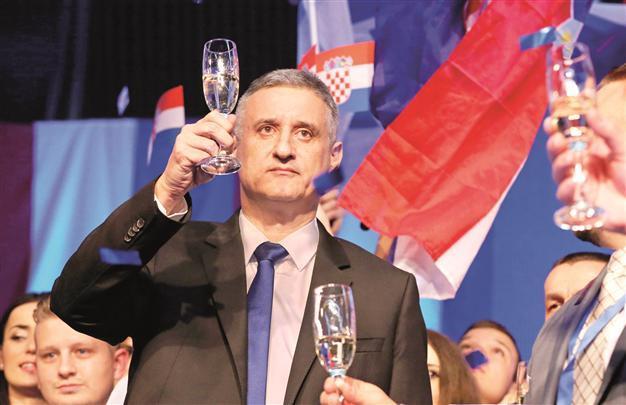Conservative opposition party wins elections in Croatia government
ZAGREB - Agence France-Presse

Leader of the conservative opposition Croatian Democratic Union party, Tomislav Karamarko and supporters celebrate initial results of the general elections in Zagreb, on November 8, 2015. Croatia's conservative opposition was leading the vote count late November 8, 2015 after a general election dominated by concerns over the migrant crisis and a sluggish economy. AFP PHOTO/STRINGER
The conservative opposition party in Croatia has narrowly won the country’s first election since joining the European Union (EU) in 2013, as the country grapples with economic hardships and an influx of migrants.Results after nearly 99 percent of votes were counted showed the opposition Patriotic Coalition, led by the Croatian Democratic Union (HDZ) party, taking 59 seats in the 151-seat parliament, just three more than the center-left bloc, led by the Social Democrats (SDP), which has ruled for the past four years, according to the State Electoral Commission on Nov. 9.
With no outright majority, new political party Most (“Bridge” in Croatian), emerged as a powerful force in national politics, coming third with 19 seats, but its leader repeated a pre-electoral pledge that his party would not enter a coalition.
Croatia’s political parties faced tough negotiations a day after the election to cobble together as the tight result means it could take weeks of horse-trading to cobble together a new government the polls.
The new government will be under pressure to push through reforms in a country slowly emerging from six years of recession and grappling with the transit of tens of thousands of migrants.
With 70 percent of votes counted in the early hours, HDZ leader and Ex-Spy Chief Tomislav Karamarko toasted success and declared victory to his supporters.
“We won the parliamentary elections... The victory brought us responsibility to lead our country, which is in a difficult situation,” he told cheering fans.
But the latest tally makes the outcome more complicated, increasing the possibility that the SDP, despite winning fewer seats, could unite with smaller parties to try and form a government.
Defiant Prime Minister Zoran Milanovic of the SDP called on Most to form a coalition with his center-left bloc as the results came in, telling his supporters: “We cannot go it alone and we need partners.”
According to the constitution, the president must consult parliamentary parties and nominate a prime minister-designate who has the support of the majority of MPs.
“Across the Bridge to a new government,” declared the front-page headline on largest circulating newspaper, Vecernji list, while the influential daily Jutarnji list said: “Most decides on a new government”.
Public debt stands at nearly 90 percent of gross domestic product and unemployment was at 16.2 percent in September -- 43.1 percent among youths.
Ahead of the vote, the premier appeared to be buoyed by his handling of the migrant crisis, which has seen nearly 350,000 people passing through Croatia, a country with around 4.2 million inhabitants, on their way to northern Europe since mid-September.
















